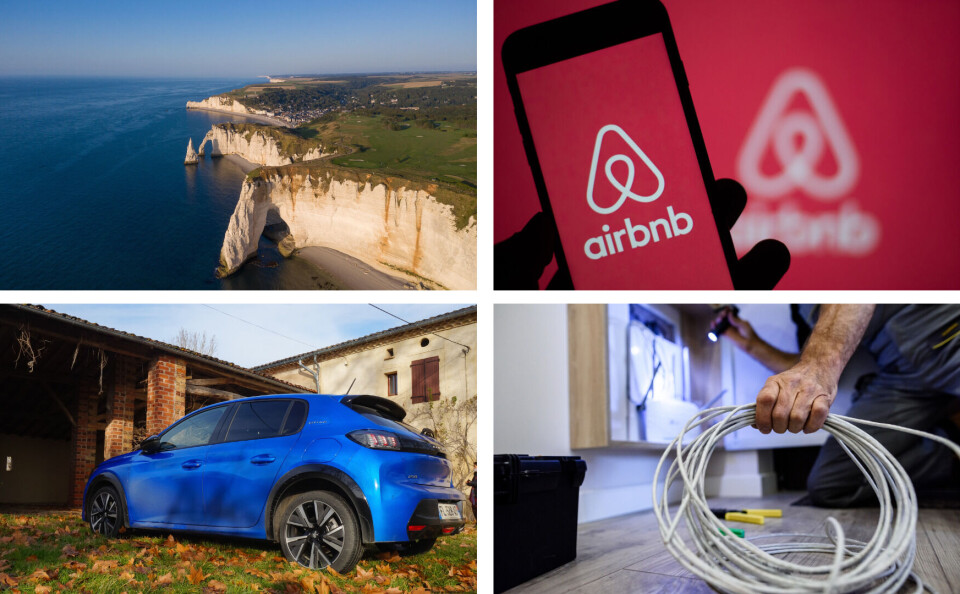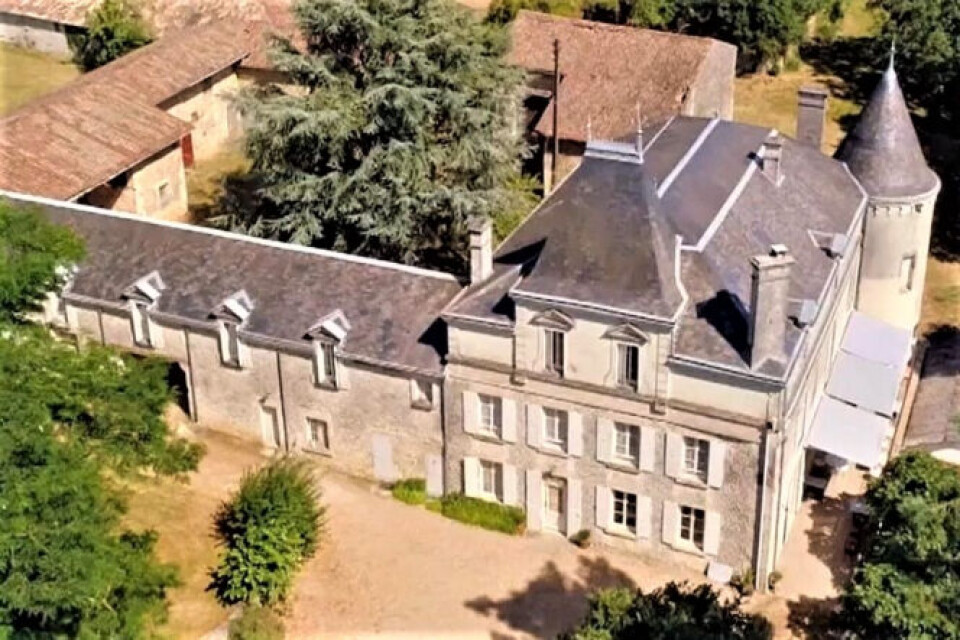-
What do you risk if you hire someone for work on your home and pay cash-in-hand?
Undisclosed payments cost French economy billions each year
-
294 French communes classified as natural disaster zones following flooding
Homeowners - including second homes - now have 30 days to make a catastrophe naturelle claim
-
House cracking threat spreads to new areas in France, putting 12 million properties at risk
Map from environment ministry shows more than half of country at risk
Natural hazards, Airbnb in court, right of way: French property update
We also look at a TV chateau for sale for €821,500, and recourse for malfunctioning wired internet in new houses

Buyers not paying enough heed to natural hazards, experts fear
Flooding, erosion and drought are still not being factored into house-buyers’ decisions, industry figures have warned.
According to the ministry of ecological transition, more than 50,000 homes in France will be affected by coastal erosion and flooding by 2100.
Read more: Map: The 101 French communes affected by coastal erosion
“Every five years, the cost of climate risks doubles," Pascal Demurger, CEO of insurance giant Maif, told Le Figaro.
“If we don't act, by 2050 the world will be uninsurable.”
The government is trying to raise awareness of the dangers of buying in areas of natural risk.
Since January 1, estate agencies in France have had to specify in their sale and rental adverts if a property is located in an area exposed to coastal erosion.
Sellers or landlords must also provide a report about the risks of coastal erosion to any potential buyers or tenants on the first visit to the property, and keep them up to date with any changes during the whole process of confirming the sale or rental agreement.
Read more: Buy-to-let tips, last taxe d'habitation: Five French property updates
Notaires, too, must alert buyers to natural risks when they sign the deed of sale, and architects are also now taking action. Four years ago, the profession created a post-graduate diploma on major risks so as to know how to intervene in the event of natural disasters.
Nevertheless, it does not seem to be deterring buyers from fashionable seaside resorts.
This is despite Manche and the Normandy region recently pledging millions of euros to help with relocations.
Read more: Rising sea levels provoke exodus from northern French coastline
Frédéric Violeau, a notaire in charge of national real estate statistics for the Conseil Supérieur du Notariat, told Le Figaro: "The coast is still the place where we negotiate the least.
“We don't see any awareness of the retreat of the coastline. The buyers only see the house near the sea but not the sea that can arrive in the living room.”
According to an Opinion Way survey for the National Observatory of the Living Environment, 57% of households say global warming will impact their choice of future place to live.
However, when asked to elaborate on the type of phenomena that will affect their decisions, natural disasters (floods, drought, rising water levels) received only 12% of votes, far behind heatwaves (25%).
Airbnb liable for illegal sublet of Paris home
Airbnb has been held jointly responsible for infringing a rental agreement by not checking if the tenant was allowed to sublet before advertising her home on its site.
The Paris Court of Appeal ruled on January 3 that the firm, an online platform where people can list or rent properties for short-term use, had “largely contributed” to the offence by not asking for proof that the rental was legal.
Read more: Airbnb host and company fined €189,000 for illegal rental in Paris
The case centred on a tenant who had sublet her home in the popular Marais district in the 4th arrondissement of Paris without authorisation in 2016 and 2017, for 534 days.
In 2020, a Paris judicial court had already held the platform jointly liable, and this decision was upheld by the Court of Appeal.
It made the distinction that Airbnb is not simply a host that puts two individuals in touch with one another and reminds them of the rules of renting but a content publisher, which plays an active role in the drafting of advertisements and their content via "precise instructions" and “numerous constraints”.
As such, the platform must also ensure that all the ads published on its site are legal.
Read more: Developer bans Airbnb-style rentals in new French homes
Jonathan Bellaïche, the property owner's lawyer, told AFP that the decision is a reminder "that these web giants have the necessary means to ensure the dissemination of content that respects our legal principles”.
Airbnb and the tenant will have to pay the owner nearly €32,400, the difference between the money fraudulently earned from subletting (€51,936) and the 20 months of rent (€19,540) paid to the owner over the period, as well as her €7,000 legal fees.
In a statement to AFP, Airbnb France argued "this case is strictly a private dispute between a landlord and a tenant" and said it was considering "all options to contest the decision".
Read also: Tourist reports hidden cameras near shower in her Airbnb in France
Vehicular access over neighbouring property is legal, court rules
Homeowners can claim a right to drive over a neighbour’s property to access their own - as long as there is no other way.
A French court passed the ruling on December 7, after the owner of a completely enclosed property complained that his neighbour had forbidden him access other than on foot over their land.
The neighbours argued that this had always been the case and that the proximity of the street and the possibility of parking on it allowed for easy access to the enclosed house.
Read more: Can you leave your car parked on the street in France?
They added that the narrowness of the passage would impede emergency vehicles, reports Le Figaro.
However, the Cour de cassation ruled that “access by motor vehicle corresponds to the normal use of land intended for habitation”.
As long as it was not impossible to make provision for it, a homeowner can claim a right of way by car.
It added that the proximity of the road as well as historic arrangements with previous owners over a footpath were no grounds to rule otherwise.
Read more: Owner of French chateau blocks access to walkers
According to the court, all land must be accessible to its owners in various ways depending on its use.
For a small, undeveloped parcel of land in steep terrain, a footpath may be sufficient, but in the case of agricultural land, for example, access by the machinery used to cultivate it would be necessary.
Escape to the Chateau DIY property up for sale

Fans of Escape to the Chateau and its spin-off series can get their hands on a sprawling French property of their own – one of the chateaux which starred in the programmes has come on the market for €821,500.
The property featured in Escape to the Chateau DIY, which follows families who, like Dick Strawbridge and Angel Adoree before them, are renovating large homes or looking to buy one.
Read more: French fortress set for auction again after €900,000 bid falls through
In this instance, most of the hard work has already been done, however. The listing describes a property that has been “renovated to a very high standard by the current owners, who have also worked hard to restore it to its rightful place in the hearts and life of the local community”.
Among improvements is the creation of a self-contained apartment and studio/gîte, as well as a fully licensed vintage tea room. There are also bed and breakfast suites and a popular British food store.
Architectural plans and permissions to create a further six gîtes, a restaurant and a large reception room have already been obtained – so there is still scope to get your hands dirty!
The chateau is set in 1.54 hectares of land, which includes a small lake with a waterside wooden pavilion.
It is located in Saint-Maixent-l'Ecole, not far from Niort, in Deux-Sèvres.
Wired internet connections fall under new house guarantees
If you buy a new-build property with wired internet, you are entitled to a guarantee of its good working order for two years, France’s highest court has ruled.
The decision, handed down by the Cour de cassation in December, means builders are presumed liable for malfunctions of any computer cabling or sockets they put in, just as they would be for fittings such as doors, windows, heating and shutters.
Read more: How do I find the best TV and internet provider for my French home?
However, the builder in question, who has not been identified, argued that this garantie de bon fonctionnement only applies to moving elements of the home, and not to static parts.
Computer cabling and sockets were not moving parts, the argument went, and dissatisfied customers should invoke the builder's classic civil liability, which involves proving fault and consequential damage first.
However, the Cour de cassation maintained that a computer network is not static since its purpose is to transport electrical signals, which it must degrade as little as possible.
This constitutes an activity, it said, and consequently it is up to the builder to repair or replace anything that is defective for up to two years after completion.
Read more: Court rules garantie décennale does not cover tiles
The builder also argued that any issues with wired internet connections should be apparent at the time of delivery, to rule out any liability based on hidden defects but the judge also rejected this argument, reports BFM.
Related articles
Shed tax rise, renovation aid, rental prices: French property updates
French property in 2022 and 2023 predictions: Low sales, rising prices
Energy audits, tax, grants: What is new for property in France in 2023
























